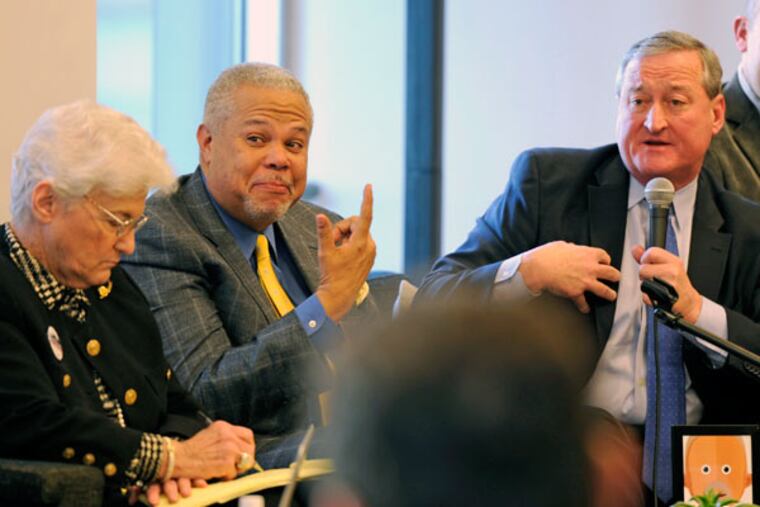Kenney backers' poll finds a tight race with Williams
A poll conducted last week for a group supporting Democratic mayoral candidate Jim Kenney shows him in a statistical dead heat with one of his five rivals, State Sen. Anthony H. Williams.

A poll conducted last week for a group supporting Democratic mayoral candidate Jim Kenney shows him in a statistical dead heat with one of his five rivals, State Sen. Anthony H. Williams.
The pollsters said Kenney had the support of 26 percent of likely voters surveyed, while Williams had 25 percent, former District Attorney Lynne M. Abraham 20 percent, former State Sen. T. Milton Street 4 percent, and former Judge Nelson Diaz and former mayoral aide Doug Oliver at 3 percent each, with 19 percent undecided.
The results of the poll, conducted Tuesday and Wednesday via automated "robocalls," contrasted with those of a survey conducted two weeks earlier for the Abraham campaign. That poll of 500 registered voters had Abraham leading with 30 percent; Williams and Kenney each had 14 percent, with 29 percent undecided.
The Abraham poll was conducted March 14-17 just as a television ad campaign for Kenney had begun. Since then a number of ads have aired on behalf of Kenney and Williams, their frequency increasing with the passage of time. The other candidates and their backers have yet to launch television campaigns.
The poll on behalf of Kenney's backers suggests the influence of the ads.
The pollsters surveyed 644 Philadelphia voters who said they were likely or certain to vote in the May 19 Democratic primary. The margin of error was put at plus or minus 3.7 percentage points.
The survey was conducted by Public Policy Polling, of Raleigh, N.C., on behalf of Forward Philadelphia, a nonprofit created to support Kenney and funded by progressives, LGBT activists, and labor unions, including the American Federation of Teachers. Forward Philadelphia has been running ads in support of Kenney.
Public Policy Polling is a national firm that generally works for Democratic clients. Its director, Tom Jensen, said he was struck by Kenney's relative strength in favorability among Philadelphia voters: 43 percent of those polled had a favorable opinion of the former city councilman, compared with 23 percent unfavorable; Williams' numbers were 37 percent to 28 percent; Abraham's, 42 to 39.
Internal statistics in the poll could raise questions about assumptions in the six-way contest.
For instance, Williams, who is African American, did well among black voters, with 39 percent support, but conceded 15 percent of those voters to Kenney and 11 percent to Abraham.
Among female voters, Abraham, the lone woman in the race, polled in third place with 20 percent to Williams' 29 percent and Kenney's 21 - though the margin of error is greater for those narrower slices of the poll.
Diaz, who has played up his Latino roots in the campaign, had only 19 percent of Hispanics polled, trailing Street's 24 percent.
While Oliver, 40, has made much of his youth, aiming to appeal to millennials, the pollsters found him trailing the other candidates among voters between ages 18 to 45.
At least one finding seemed unsurprising: Three-quarters of those polled said their opinion of Street - who served time in prison for unpaid taxes - was unfavorable.